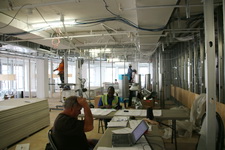Two recent letters – one from 16 Democratic Senators to Treasury Secretary Steven Mnuchin and the other from 58 House Republicans to GOP leadership – urge policymakers to fix an unintentional drafting mistake in last year’s tax overhaul that mistakenly increased the cost recovery period for qualified improvement property (QIP). (House Letter, Oct 2 and Senate Letter, Sept 24)
 |
The tax policy drafting error currently affects leasehold improvements, expenditures made to improve common spaces in shopping centers and office buildings, and other interior improvements to nonresidential structures. |
- The drafting error in the tax law has resulted in a significantly longer 39-year cost recovery period for new, qualified nonresidential interior improvements. The original intent of Congress was to allow the immediate expensing of QIP – or provide a 20-year recovery period in the case of taxpayers electing out of new limitations on the deductibility of business interest.
- The mistake currently affects leasehold improvements, expenditures made to improve common spaces in shopping centers and office buildings, and other interior improvements to nonresidential structures. The current, longer cost recovery period effectively increases the after-tax cost of upgrading and improving commercial real estate. ("Correcting the Drafting Error Involving the Expensing of Qualified Improvement Property" – The Tax Foundation , May 30)
- In Monday's joint letter to House Speaker Paul Ryan (R-WI) and House Ways and Means Committee Chairman Kevin Brady (R-TX), 58 House Republican members state, "While they wait for Congress to act to correct this error, these businesses are forgoing renovations, halting plans to revitalize declining malls, and placing safety improvements on hold. Not only does this hurt restaurants and retailers, but also the businesses involved in the planning and renovations, and ultimately our communities.
- This week's House letter urges GOP leadership to address the QIP investment drafting error via legislation, while also recommending that Treasury should issue interim guidance while refraining from enforcing the drafting error.
 |
Congress could address the issue during the lame duck congressional session between the mid-term election and January. |
- In the Sept. 24 joint letter to Secretary Mnuchin, 16 Senate Democrats address the need for a QIP correction, stating: "Improper implementation of this portion of the 2017 law would cause disruption to a wide range of industries, including the nation's retail, restaurant and commercial property industries. Given this, and the potential for considerable harm to local economies, we believe it would be prudent for Treasury to address this issue and its interpretation through guidance."
- The Real Estate Roundtable and a broad-based business coalition urged Secretary Mnuchin in August to issue guidance clarifying certain provisions included in tax overhaul legislation enacted last year – including the cost recovery period for qualified improvement property. (Coalition letter, Aug. 22)
- Roundtable President and CEO Jeffrey DeBoer stated, "In 2015, Congress voted overwhelmingly to permanently extend the 15-year recovery period for certain property improvements. By passing tax reform, Congress intended to consolidate those changes. Treasury should now use its authority to provide taxpayers with relief until a technical corrections bill is enacted. Treasury guidance will remove taxpayer uncertainty, unlock investment, and spur job-creating property upgrades and renovations." (Roundtable Weekly, Aug. 24)
Congress could address the issue during the lame duck congressional session between the mid-term election and January. A number of tax issues are outstanding, including tax reform technical corrections and expired tax provisions.

